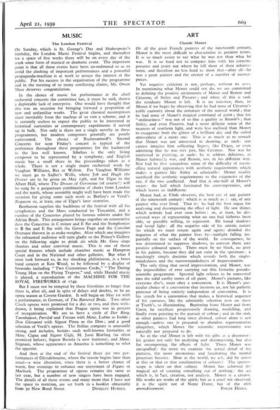ART
Claude Monet
OF all the great French painters of the nineteenth century, Monet is the most difficult to characterise in positive terms. It is so much easier to say what he was not than what he was. It is so hard not to compare him with his contem- poraries and point out where he fell short of their achieve- ment, and therefore no less hard to show that—after all—he was a great painter and the creator of a number of master- pieces.
Yet negative criticism is not, perhaps, without its uses. In mentioning what Monet could not do, we are committed to defining the positive attainments of Manet and Renoir and Cezanne, of Sisley and Pissarro ; and when all this is said, the residuary Monet is left. It is no injustice, then, to Monet if we begin by observing that he had none of Cezanne's noble curiosity about the armature of the natural world ; that he had none of Manet's magical command of paint ; that his " ordinariness " was not of so fine a quality as Renoir's ; that Sisley, and even Pissarro, had a more delicate sense of the nuances of northern light, and were less inclined than Monet to exaggerate both the glitter of a brilliant day and the veiled atmosphere of a misty one. This is as much as to remark that Monet was not Interested in drawing, as such : one cannot imagine him collecting Ingres, like Degas, or even admitting that he was fres fort, like Cezanne. Nor was he interested in painting, as such: he is seldom delicious, as Manet habitua:ly was, and Renoir, too, in his different way. Nor had he that scrupulous sense of the difficulty of recon- ciling natural appearances with aesthetic requirements which makes a painter like Sisley so admirable : Monet readily sacrificed the aesthetic requirements to the exigencies of the eye, if the two conflicted. And that is one-half of Monet's secret : the half which fascinated his contemporaries, and which leaves us indifferent.
Monet had, as Uhde observes, the best eye of any painter of the nineteenth century : which is as much as say, of any painter who ever lived. That is : he had the best organ for analysing and decomposing the effect of light. He saw things which nobody had ever seen before : or, at least, he dis- covered ways of representing what no one had hitherto been able, or possibly willing, to represent. He hated shadows and loved light : all the negative side of his artistic nature (to which we must return again and again) dreaded the negation of what the painter lives by—sunlight falling im- partially on the surface of the world. In consequence, he was determined to suppress shadows, to convert them into positive coloured spaces. There must be no black, no grey in his palette, because they did not exist in the spectrum : a touchingly simple doctrine which reveals both the single- mindedness and the narrowmindedness of impressionism.
The only thing that saved impressionism, and Monet, was the impossibility of ever carrying out this fantastic pseudo- scientific programme. Spectral light refuses to be converted into the solid earthy terms of oil paint. Monet's pictures, like everyone else's, must obey a convention. It is Monet's par- ticular choice of a convention that interests us, not his pathetic pretence of being entirely independent of convention. It is his search for a convention that makes a historical sequence of his canvases, like the admirable selection now on show at Tooth's, so illuminating. Beginning from Manet and from Corot, he sacrifices progressively drawing, modelling, and finally even painting to the pursuit of colour ; and in the end, as other painters had long since divined, colour alone is not enough—unless one is prepared to abandon representation altogether, which Monet the scientific impressionist was naturally not prepared to do.
So in the end Monet is left with his gifts as a decorator : his genius not only for analysing and decomposing, but also for recomposing, the effects of light. There Monet was unequalled: the more we examine the actual detail of his pictures, the more mysterious and fascinating the mental processes become. How in the world, we ask, did he arrive at this or that or that combination of colours? The spectro- scope is silent on that subject. Monet has achieved the magical act of creating something out of nothing : the act which is, in tact, creation, not analysis. Monet is a creator. His works are works of the spirit; but as a 'cruel wit observed, it is the spirit not of Notre Dame, but of the r6th










































 Previous page
Previous page